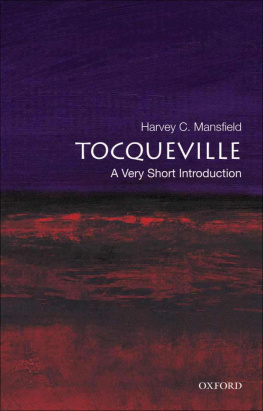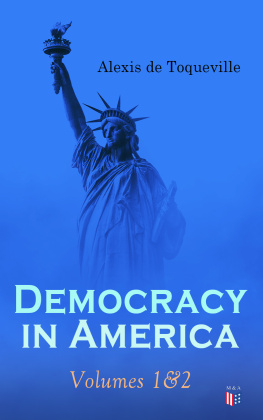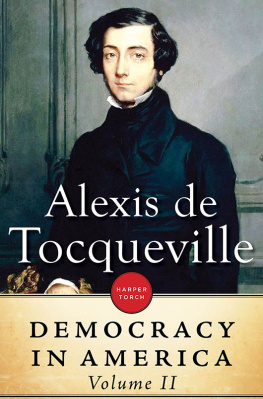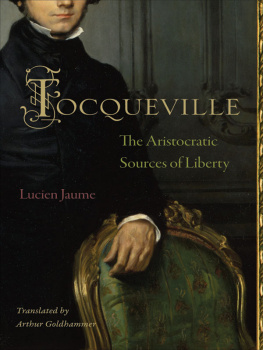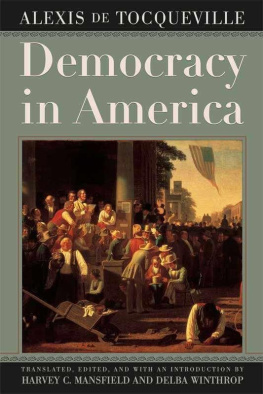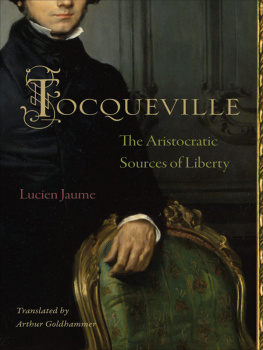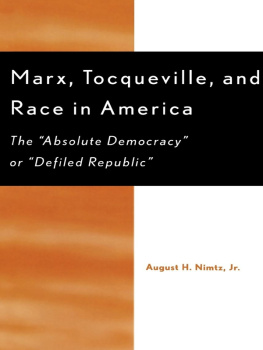Harvey C. Mansfield - Tocqueville: A Very Short Introduction
Here you can read online Harvey C. Mansfield - Tocqueville: A Very Short Introduction full text of the book (entire story) in english for free. Download pdf and epub, get meaning, cover and reviews about this ebook. City: New York, year: 2014, publisher: Oxford University Press, genre: Politics. Description of the work, (preface) as well as reviews are available. Best literature library LitArk.com created for fans of good reading and offers a wide selection of genres:
Romance novel
Science fiction
Adventure
Detective
Science
History
Home and family
Prose
Art
Politics
Computer
Non-fiction
Religion
Business
Children
Humor
Choose a favorite category and find really read worthwhile books. Enjoy immersion in the world of imagination, feel the emotions of the characters or learn something new for yourself, make an fascinating discovery.
- Book:Tocqueville: A Very Short Introduction
- Author:
- Publisher:Oxford University Press
- Genre:
- Year:2014
- City:New York
- Rating:4 / 5
- Favourites:Add to favourites
- Your mark:
Tocqueville: A Very Short Introduction: summary, description and annotation
We offer to read an annotation, description, summary or preface (depends on what the author of the book "Tocqueville: A Very Short Introduction" wrote himself). If you haven't found the necessary information about the book — write in the comments, we will try to find it.
Abstract: No one has ever described American democracy with more accurate insight or more profoundly than Alexis de Tocqueville. After meeting with Americans on extensive travels in the United States, and intense study of documents and authorities, he authored the landmark Democracy in America, publishing its two volumes in 1835 and 1840. Ever since, this book has been the best source for every serious attempt to understand America and democracy itself. Yet Tocqueville himself remains a mystery behind the elegance of his style. Now one of our leading authorities on Tocqueville explains him in this splendid new entry in Oxfords acclaimed Very Short Introduction series. Harvey Mansfield addresses his subject as a thinker, clearly and incisively exploring Tocquevilles writings--not only his masterpiece, but also his secret Recollections, intended for posterity alone, and his unfinished work on his native France, The Old Regime and the Revolution. Tocqueville was a liberal, Mansfield writes, but not of the usual sort. The many elements of his life found expression in his thought: his aristocratic ancestry, his ventures in politics, his voyages abroad, his hopes and fears for America, and his disappointment with France. All his writings show a passion for political liberty and insistence on human greatness. Perhaps most important, he saw liberty not in theories, but in the practice of self-government in America. Ever an opponent of abstraction, he offered an analysis that forces us to consider what we actually do in our politics--suggesting that theory itself may be an enemy of freedom. And that, Mansfield writes, makes him a vitally important thinker for today. Translator of an authoritative edition of Democracy in America, Harvey Mansfield here offers the fruit of decades of research and reflection in a clear, insightful, and marvelously compact
Harvey C. Mansfield: author's other books
Who wrote Tocqueville: A Very Short Introduction? Find out the surname, the name of the author of the book and a list of all author's works by series.

